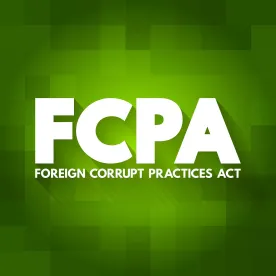The international trade and regulatory environment never has been more difficult for multinational corporations to navigate. For companies that operate, source from, or sell goods, software, or services across borders, legal complexities abound. International trade wars, rapidly changing export control and economic sanctions requirements, increasingly stringent anticorruption requirements, and many other international trade and regulatory issues present existential risks to most multinational organizations.
What are the Anti-Corruption Requirements?
- The U.S. Foreign Corrupt Practices Act (FCPA) prohibits companies, their subsidiaries, and their officers, directors, employees, and agents from corruptly offering anything of value to a foreign official to obtain or retain business or to secure any improper business advantage. The FCPA is enforced by two U.S. government agencies: the U.S. Department of Justice (DOJ) and the U.S. Securities & Exchange Commission (SEC).
- The FCPA’s jurisdictional scope is broad, covering U.S. persons (individuals and companies); any issuer with stock traded on U.S. stock exchanges or with securities subject to SEC filing requirements; the officers, directors, employees, and agents of the above; and any person or entity violating the FCPA within the U.S. Issuers also are subject to the FCPA’s accounting and internal controls provision, which requires issuers to keep accurate books and records in sufficient detail to reflect the true nature of transactions.
- Beyond the FCPA, multinational companies are subject to anti-corruption laws in numerous other countries, which may impose even more stringent anticorruption requirements, including for commercial bribery to private persons.
Why Are Anti-Corruption Regulations Important to My Company?
- Anticorruption violations can have significant direct consequences, including criminal convictions, fines in the tens or hundreds of millions of dollars, disgorgement of profits, and civil penalties.
- Investigation costs often exceed the penalty amounts. In addition to the reputational harm, corruption-related violations can lead to parallel investigations and enforcement actions in multiple countries, shareholder suits against officers and directors, breach of loan covenants and other contracts, and debarment or blacklisting proceedings.
What Areas Present Anti-Corruption Risks for My Company?
- Ineffective oversight of third parties interacting with government officials is a major driver of anti-corruption enforcement actions. Companies that employ consultants, agents, and distributors; that rely on a distribution or franchise model; or that maintain non-U.S. joint ventures are at especially high risk, especially if they engage third parties to obtain government permits, licenses, or otherwise have frequent contact with government officials.
- The presence of many State-Owned Enterprises (SOEs) in China and developing countries raises FCPA concerns, as even SOEs operating as ordinary commercial entities trigger FCPA requirements, as every employee is treated as a government official under the FCPA.
- In the M&A space, the DOJ and SEC have been aggressively asserting claims against acquiring companies, often using theories of successor liability, for pre-merger conduct of their targets that violated the FCPA.
- The DOJ and SEC have emphasized the need to conduct regular anti-corruption compliance risk assessments, particularly after events that could significantly impact business operations such as the global COVID-19 pandemic, entrance into new markets, or a corporate acquisition. Such events generally introduce new, expanded, or revised internal controls; increased governmental interactions; new employees; unique jurisdictional requirements; or new business partners and third-party relationships, each of which may present novel or heightened anti-corruption risks.
- Global cooperation and coordination between U.S. and foreign enforcement agencies has increased appreciably, with countries often sharing information (as well as simultaneously imposing fines and penalties).
What Are the Most Common Anti-Corruption Errors at Typical Multinational Companies?
- The DOJ and SEC expect companies to maintain compliance policies, internal controls, and training programs tailored to their anti-corruption risk profile.
- FCPA best practice guidelines published by the DOJ and the SEC set a baseline for corporate conduct, raising the stakes for multinational companies without adequate compliance programs. Moreover, the increased emphasis on know-your-business-partner initiatives has resulted in lenders and customers looking more closely at the steps taken by their business partners to mitigate anti-corruption risks.
- The most common shortcomings we see are: (1) failure to conduct periodic risk assessments that specifically address anti-corruption issues based on the geographies in which a company operates and how the company goes to market; (2) failure to conduct appropriately tailored due diligence on high-, medium-, and low-risk third parties and business partners; (3) failure to monitor third-party relationships on an ongoing basis; (4) failure to conduct adequate anti-corruption due diligence in connection with M&A activity; (5) failure to implement, communicate, and monitor ethics hotlines; (6) failure to conduct targeted red-flag training for key business functions; (7) failure to conduct anti-corruption audits and compliance checks; (8) failure to incorporate appropriately tailored anti-corruption provisions in contracts with third parties; and (9) failure to monitor and periodically audit gifts and entertainment spending, particularly with respect to business courtesies provided to government officials and employees of state-owned enterprises.






 />i
/>i

